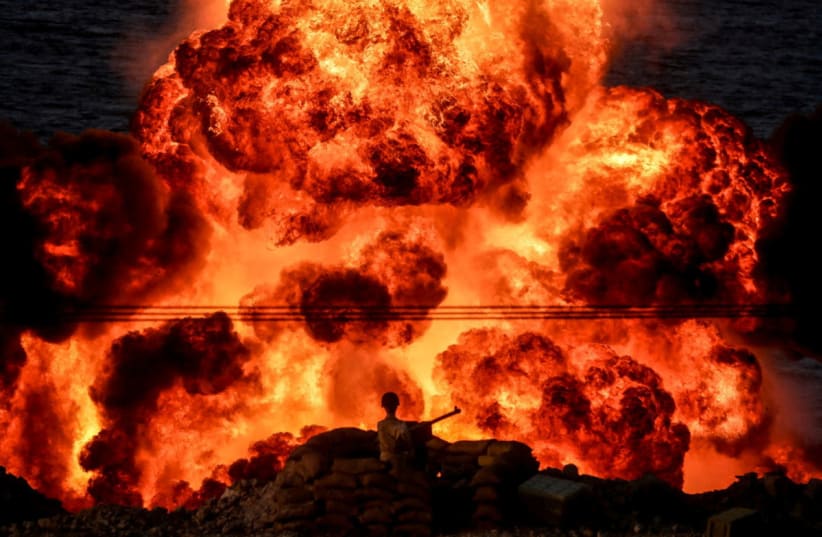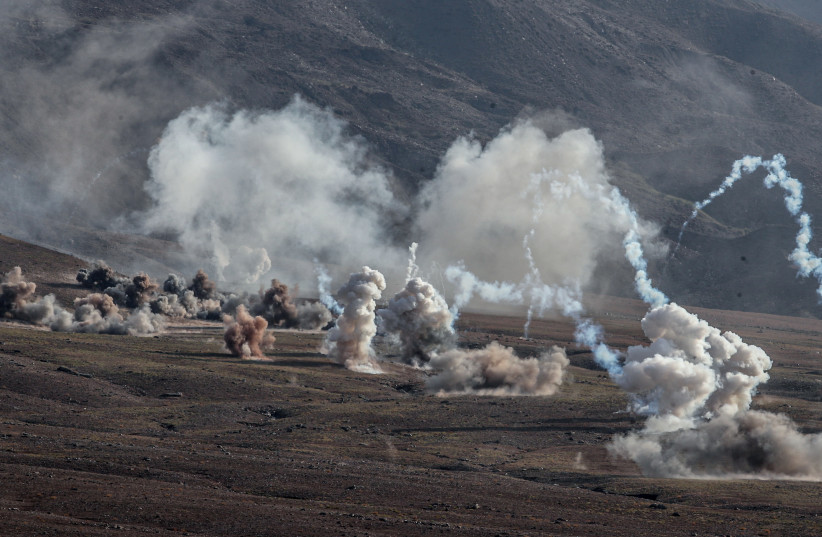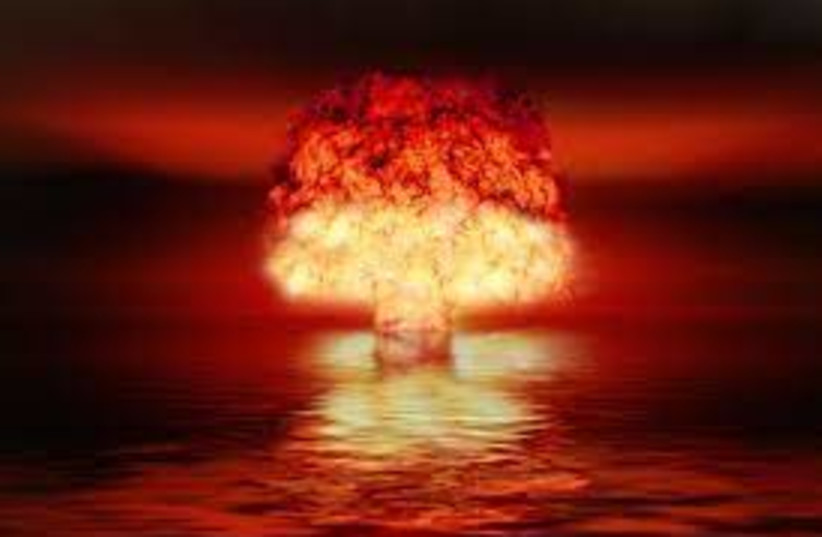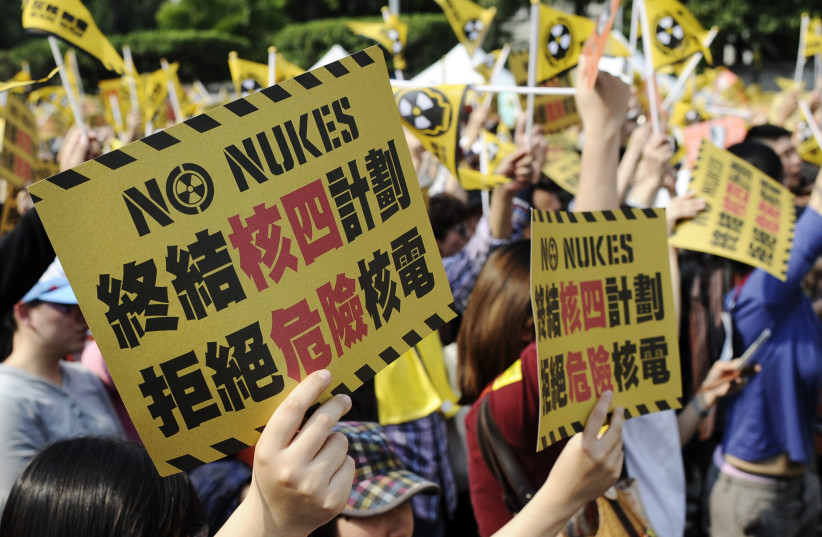A new think tank report obtained by The Jerusalem Post warns of the possibility of Iran launching an accelerated effort to achieve a few “crude” nuclear weapons in six months.
According to Monday’s report by Institute for Science and International Security president David Albright, even though top Israeli officials recently told the Post that the Islamic Republic’s weapons group was two years away from being able to deliver a nuclear warhead via a ballistic missile, there could be a much more pressing threat.
In popular discussions, this option is often referred to as a “dirty” or “suitcase nuclear bomb,” but the truth is much more complex, although still quite threatening.
What is a "dirty" nuclear bomb?
The extra nuance is that no nuclear device, no matter how small, really fits into a suitcase or could be carried around by a single person.
Experts concerned about an improvised or crude nuclear bomb tend to discuss it being delivered by a vehicle, such as a truck. The explosive power of such a nuclear weapon would be much less than a full-fledged weapon delivered on a ballistic missile, but it could still be devastating.
By avoiding having to solve all of the challenges associated with measuring, miniaturizing and detonating a nuclear warhead via a ballistic missile, a smaller number of tasks could be solved in about six months.
Most of these would relate to bringing together the myriad components needed to build an actual bomb, some of which the ayatollahs have concealed in various locations across Iran dating back to 2003. Crossing at least a crude nuclear-device threshold could also involve performing an underground test to make sure the device would not be a dud.
One goal of Albright’s latest report is to inhibit or deter Iran from making a final decision to build nuclear weapons, taking into account how far along the program already is.
According to International Atomic Energy Agency reports, Iran already possesses a mix of 60% and 20% enriched uranium sufficient to build around four nuclear bombs within a period of several months – if it moves forward in a “crash course” rapid manner.
A nuclear time-crunch
The report first dissected how Tehran would most likely go about accelerating the process to finish building a nuclear device.
Although some analysts present Iran’s choice as binary – go after a full-fledged nuclear missile, which takes two years, or drop that effort and pursue just an accelerated “crude” device approach – Albright said the ayatollahs could easily move forward on parallel tracks at the same time.
According to the report, “A frequently propagated red herring is that Iran’s leadership has not decided to build nuclear weapons, [and that] it does not have a nuclear weapons program – as if only a directive to build them or the act of building them qualifies. However, for a country like Iran, a simplistic binary model does not suffice.
“Similarly, this type of categorization did not apply to Taiwan in the 1980s, when it had a program of being ready to build nuclear weapons in short order, if requested by the regime’s leadership. Taiwan had not made a decision to actually build nuclear weapons, nor had it shown any intention to build them, but it wanted to be ready to do so quickly in case a Chinese invasion was imminent,” the report said.
In that case, the US showed the resolve to take dramatic and secret steps to not only shut the program down, but insisted that Taiwan dismantle much of its associated infrastructure, including a research reactor, a secret plutonium separation plant and an extensive secret nuclear-weapons simulation and high-explosives testing program.
Further, as a lesson regarding Iran, the report said, “Taiwan had given the unfinished secret plutonium separation project a civilian cover story, and the research reactor was under International Atomic Energy Agency inspections. Nonetheless, the US government was determined to block Taiwan’s pathway to a nuclear weapon once and for all.”
Likewise, the report said Iran currently “does not appear to have a program focused on the actual building of nuclear weapons. But it does appear to have a program to be prepared to make nuclear weapons and to do so in short order based on covert and overt activities and facilities.”
Nuclear weapons on demand
In essence, the report warned: “Rather than a traditional nuclear weapons program, Iran threatens the region and the world with a program ready to produce nuclear weapons ‘on demand.’”
“This type of program serves the Iranian regime’s interests,” Albright wrote. “While Iran increasingly is viewed as a nuclear power, it has so far been able to avoid harsh international and regional penalties... Given its existing capabilities, this approach also permits Iran to minimize the need for secret nuclear weapon development activities, which if discovered, could catalyze more dangerous threats against the regime.”
Next, the report gave concrete recommendations to dissuade the Islamic Republic from deciding to pursue a nuclear device of any kind beyond any progress already made.
Albright discussed increased intelligence collection being able to detect any new decisions, as well as various political pressures, including diplomatic threats to snap back global sanctions to pull Iran in line.
Crucially, however, the report also said: “Iran needs to be made fully aware that building nuclear weapons will require drastic and serious actions by the international community, including military action.
“The threat of military force weakened after the negotiation of the JCPOA in 2015. Iran grew to perceive the United States as reluctant to use force and Israel as fearful and unable to launch an effective attack,” the report said, using the abbreviation for the Joint Comprehensive Plan of Action nuclear deal.
“This tendency is being reversed, but not quickly enough,” the report said. “The Western powers should get serious about offensive military options to destroy Iran’s nuclear facilities if Iran moves to build nuclear weapons, diverts nuclear material, or withdraws from the Nuclear Non-Proliferation Treaty.”
More specifically, Albright emphasized, “A useful first step is President [Joe] Biden’s declaration that military force could be used as a last resort to stop Iran building nuclear weapons; the United States and Israel’s recent drill simulating a strike on Iran is also important.”
Moreover, he said, “US military cooperation with Israel should continue to be bolstered, ensuring Israel can decisively strike Iran’s nuclear sites on short notice if there are signs Iran is moving to build nuclear weapons, including the ability of delivering a second strike if Iran reconstitutes those activities.”



